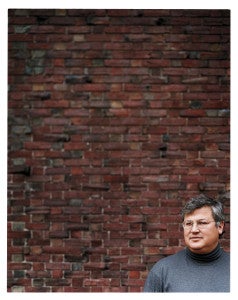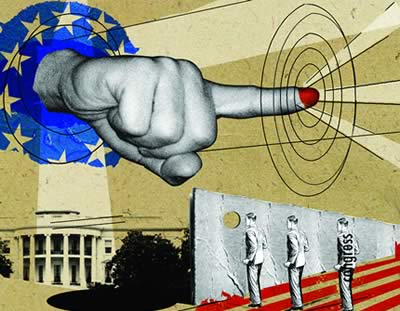For all his eloquence and conviction, Jack Goldsmith is a quiet man.
For three years, he remained silent about his brief and controversial stint as head of the Office of Legal Counsel in George W. Bush’s Department of Justice. And even following the much-publicized publication of his book “The Terror Presidency” in September, Goldsmith does not relish the steady demand for comment about his Department of Justice tenure.
“I like to write books. I don’t like to talk about them,” says Goldsmith, who joined the HLS faculty in 2004. Nevertheless, he spoke about the book in his Griswold Hall office after rushing back to campus from an hour-long interview on National Public Radio. In the week prior, his book had spawned a front-page story in The Washington Post, a lengthy article in The New York Times Magazine, a Bill Moyers segment and countless entries in the blogosphere.
“Goldsmith is suddenly everywhere,” wrote Benjamin Wittes in The New Republic.
The Los Angeles Times called “The Terror Presidency” an “important book—and a genuine service to the national interest—on several levels, none more pressing than its implicit demand for a sober consideration of the current historical moment in all its complexity.” In The New York Times, Michiko Kakutani wrote: “The portrait of the Bush administration that Mr. Goldsmith—who resigned from the Office of Legal Counsel in June 2004, only nine months after assuming the post—draws in this book is a devastating one. It is a portrait of a highly insular White House obsessively focused on expanding presidential power and loath to consult with Congress, a White House that frequently made up its mind about a course of action before consulting with experts, a White House that sidelined Congress in its policy-making and willfully pursued a ‘go-it-alone approach’ based on ‘minimal deliberation, unilateral action and legalistic defense.’”

Goldsmith criticizes the Bush administration’s approach but supports its mission to fight terrorism aggressively.
True, the headlines have seized on Goldsmith’s critique of some of his former colleagues. But Goldsmith is careful to point out that the book and its subject matter are more complicated than that. For example, he never forgets that those whom he criticizes are under enormous pressure to prevent a catastrophic terrorist attack, and they are motivated by the best of intentions. As Wittes wrote: “Goldsmith’s actions in government took immense courage, and he deserves all of the plaudits anyone today wants to throw his way. … [But] the story Goldsmith tells is, in truth, a complicated one. It is not all a critique of the Bush administration; on many points Goldsmith defends his former colleagues.”
For two years after he left the government, Goldsmith says, he reflected on his role as the frontline lawyer responsible for ensuring the executive branch’s compliance with the law, particularly in the uncharted area of waging a “war on terrorism.” The conflicts he experienced, he realized, were critically important to understanding the modern presidency and the pressures on it. In part, the book is Goldsmith’s effort to set the record on his service straight. But it’s largely an examination of the novel legal problems the Bush administration faces and the central but mostly hidden role that lawyers play in shaping modern war policy.
Like many of his colleagues in the administration, Goldsmith was no fan of some of the laws constraining executive action in response to the terrorist threat. But as long as those laws were on the books, he says, he was determined to interpret them correctly, and he refused to engage in sophistry or tortuous parsing of language for the sake of giving his superiors the legal opinions they wanted.
Goldsmith arrived at the Department of Justice on Oct. 6, 2003, coming from a legal job at the Department of Defense, during a leave from the faculty of the University of Chicago Law School. That afternoon, then White House Counsel Alberto Gonzales ’82 called him with his first rush assignment: “We need you to decide whether the Fourth Geneva Convention protects terrorists in Iraq. We need the answer as soon as possible, no later than the end of the week.”
Goldsmith concluded that the Geneva Conventions did extend to Iraqi terrorists in Iraq, including those who were Al Qaeda members. It was not the response that Gonzales or David Addington, Vice President Dick Cheney’s former counsel, wanted. Goldsmith writes: “If Gonzales seemed puzzled and slightly worried, David Addington was just plain mad. ‘The president has already decided that terrorists do not receive Geneva Convention protections,’ he barked. ‘You cannot question his decision.’’’
This kind of battle marked Goldsmith’s nine months at OLC. “I was the person interpreting legal restrictions that no president in a time of national crisis had ever had to face before,” he says.
Although terrorism presented novel issues for Bush, Goldsmith faults the administration for not pursuing traditional political means to address them. Rather than appealing to Congress, Bush touted the concept of the unitary executive and pursued a unilateral approach to many terrorism-related issues that necessitated a phalanx of lawyers to craft policy at the murky edges of the law. A more effective approach, Goldsmith believes, would have been to follow the examples of Presidents Lincoln and Roosevelt, who consulted with Congress, asked for the powers they believed they needed and generally received them.
At OLC, Goldsmith also discovered that some of the earlier legal opinions issued by the office’s lawyers in the Bush administration were flawed, particularly the two now-infamous “torture memos” outlining standards for interrogation. Goldsmith was uncomfortable with their legal reasoning, their tone and their breadth. One memo went so far as to conclude that, “Any effort by Congress to regulate the interrogation of battlefield detainees would violate the Constitution’s sole vesting of the Commander-in-Chief authority in the President.”
Although there was no precedent for withdrawing OLC opinions within the same administration, Goldsmith decided that he had to withdraw the torture memos. He wanted to first provide “replacement guidance,” but, when the torture memos were leaked to The Wall Street Journal, he could wait no longer. He withdrew them and resigned on the same day in June 2004. Doing both at once, he hoped, would make it difficult for the White House to reverse his decision without making it look as if he had resigned in protest.
Goldsmith criticizes Bush’s approach while supporting his mission to fight the war on terror aggressively. He emphasizes the pressure of working in an environment where daily “threat reports” outline possible attacks against the U.S. and policy-makers are haunted by the ever-present fear that taking overaggressive measures in surveillance and detention will land them in front of a grand jury or a court.
Goldsmith does not expect to be invited back into government service anytime soon. After nine months of working round the clock in Washington and seeing little of his wife and two young sons, he is content to live a more normal life.
With a shrug, he concedes that his work outside the government is unlikely to have the same direct influence as his work inside it. “The connections between one’s actions and consequences are much tighter inside the government,” he says. “Academic influence is more diffuse.”
Nevertheless, from the distance of academia, Goldsmith will continue to keep a close eye on the executive branch, particularly his old office. “The OLC had an extremely important place, and I worry that the office has been diminished,” he says. “I tried to put it back on the right course, but now its central role is more public, which might make a difference come confirmation time.”
“There has to be a place that is devoted to making sure that the executive branch complies with the law and can execute its full prerogative.”
